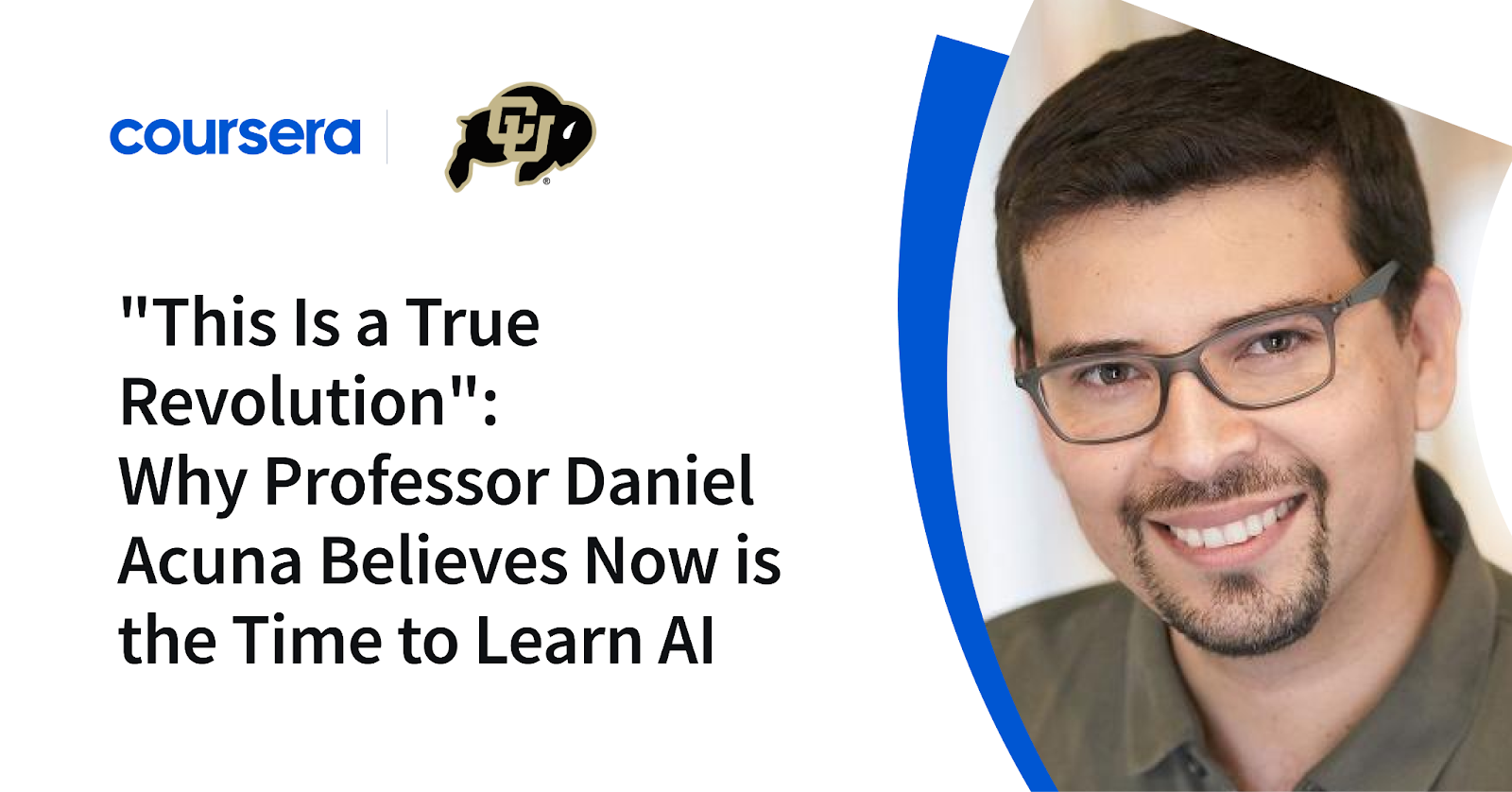Daniel Acuna has always wanted to talk to computers. Long before large language models, before Python and GPUs, he was a curious student in Chile trying to build a chatbot, without formally knowing how to program. “I thought I could interact with the computer,” he says. “And somehow, I got it to respond to a few prompts. It gave me butterflies. It sounds cliché, but I’ve always wanted to talk to computers.”
That passion, along with years of academic and scientific training, has carried Acuna across disciplines and continents, and today he’s a faculty member in the University of Colorado Boulder’s new online Master of Science in Artificial Intelligence. From studying computer science as an undergrad to earning a PhD in the same field at the University of Minnesota and completing a postdoc in neuroscience, Acuna has spent his career trying to understand how humans and machines learn. His verdict: AI is no passing trend.
“I’ve been a witness to major AI advancements over the last 20 years,” he says. “But what’s happening right now is a true revolution. AI is becoming the base layer of our society, affecting life, work, and education, and we need to be prepared for that. We can’t escape it. We need to become a part of it.”
A Mission to Expand Access, With or Without Prior AI Experience
The CU Boulder online MS in Artificial Intelligence was designed with that revolution in mind. Acuna admits he was skeptical at first—“I was against the idea that people could get the same degree online as on campus”—but his views quickly changed.
“This technology is going to impact every field,” he says. “Restricting access to only people who live in Boulder, who can block a large chunk of their lives to study in a traditional program, is not enough. We need to be teaching people everywhere.”
The online format allows students from all walks of life and corners of the globe to gain advanced AI skills, and apply them to fields like healthcare, finance, education, and science. It also welcomes students without prior experience in machine learning.
“If you like numbers and quantitative work, this is a great course,” Acuna says. “You don’t need a background in AI or machine learning. We’ll assume you’re starting with the basics.”
When asked to define “the basics,” Acuna continued, “Critical thinking, curiosity, math–you cannot avoid math, linear algebra, calculus, and probability.” he chuckled. “It also helps to know how to think about ML, how to make a machine learn without explicitly telling it what to do, and you need to understand the importance of data and how to evaluate the performance of a machine once it learns.”
Teaching AI with Purpose and a Realistic Viewpoint
Acuna teaches CU Boulder’s Machine Learning Specialization, a foundational pathway in the MS in AI program, as well as the MS in Data Science and MS in Computer Science. His course is one of a few that make up the performance-based admissions that the MS in AI degree offers.
In his classes, students engage in a mix of traditional assessments, collaborative discussions, and hands-on projects. In his emphasis on understanding the fundamentals, he also noted the value of learning how to apply them across fields. Students are even encouraged to use AI tools in their assignments, just as they would in real-world scenarios.
“It’s going to be a fun course. People will learn a lot, and they’ll actually be able to apply it to their own fields and lives.”
But Acuna doesn’t sugarcoat the challenges of AI. He’s a realist about the rapid pace of change, the hype cycles, and the ethical complexity of the field.
“Things come and go in this field. I was very skeptical of neural networks at first. But the tools we have now—large language models, multi-modal AI—they’ve revolutionized what’s possible.”
Looking Ahead: AI in Education and Beyond
In the next 10 to 20 years, Acuna predicts, AI won’t just be a tool we use in niche areas—it will become a partner in how we learn.
“Very soon, we’re going to be using AI to help teach us. In my field of science, we will use it as an assistant or even a colleague. Human agents working alongside AI agents. It’s hard to stop this progress. There will be challenges, but we need to deal with them, speak up, and help shape this future.”
That’s exactly what he hopes students in the online MS in AI will do. His advice for anyone considering the program? Be open to failing, and keep learning through it.
“You’ll make mistakes. But then the next week, you won’t make them again. And that means something good is happening.”
Daniel Acuna’s passion for teaching was only met by his clear passion for learning, something he notes will be ongoing in the field of AI. His mission? Bring this knowledge of AI to as many people as possible while continuously learning to think about the future.
“Science is one of the most advanced things we do as humans, and we’re in a major technology shift. I hope to give a little bit of that perspective to my students.”
The Machine Learning Specialization provides an opportunity for learners to gain credits towards three online Master’s degrees from CU Boulder. These degrees include The Master of Science in Artificial Intelligence, The Master of Science in Data Science, and The Master of Science in Computer Science. The Specialization can also be applied as an elective credit to the Master of Science in Electrical Engineering and the Master of Engineering in Engineering Management. To learn more about these programs, performance-based admissions, and credit for prior learning, visit https://www.coursera.org/collections/boulder.

